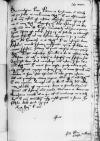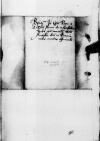Cum orationibus nostris pro salute et incolumitate Reverendissimae Paternitatis Vestrae observantiam quoque illi nostram testatam esse cupientes, magnifice gratias agimus, quod una cum ceteris reverendissimo magnificis etc. Council of Royal Prussia the most important local authority in Royal Prussia. It consisted of two bishops (of Ermland (Warmia), who served as the Council’s president, and of Kulm (Chełmno)), three voivodes (of Kulm, Marienburg (Malbork), and Pomerania), three castellans (of Kulm, Elbing (Elbląg), and Gdańsk (Danzig)), three chamberlains (of Kulm, Marienburg, and Pomerania), and representatives of the three Great Prussian Cities – Gdańsk, Thorn (Toruń), and Elbing (ACHREMCZYK 2016, p. 17-18)⌊dominis consiliariisCouncil of Royal Prussia the most important local authority in Royal Prussia. It consisted of two bishops (of Ermland (Warmia), who served as the Council’s president, and of Kulm (Chełmno)), three voivodes (of Kulm, Marienburg (Malbork), and Pomerania), three castellans (of Kulm, Elbing (Elbląg), and Gdańsk (Danzig)), three chamberlains (of Kulm, Marienburg, and Pomerania), and representatives of the three Great Prussian Cities – Gdańsk, Thorn (Toruń), and Elbing (ACHREMCZYK 2016, p. 17-18)⌋ nos domusque nostras terrae huius Royal Prussia (Prussia Regalis), region, part of Prussia annexed to the Kingdom of Poland in 1466 under the provisions of the Second Peace of Thorn⌊PrussiaeRoyal Prussia (Prussia Regalis), region, part of Prussia annexed to the Kingdom of Poland in 1466 under the provisions of the Second Peace of Thorn⌋ immunitatibus adiungere et privilegiorum consortes esse voluit. Insuper etiam nostri sollicita ex Rome (Roma), city in central Italy, on the Tiber river, seat of the Holy See⌊urbeRome (Roma), city in central Italy, on the Tiber river, seat of the Holy See⌋ missum litterarum fasciculum ad nos destinare dignata est, in cuius medio Samuel Maciejowski (*1499 – †1550), humanist and diplomat, one of the most trusted advisors to King Sigismund I and then to his son Sigismund II Augustus; from 1521 Canon of the Collegiate Chapter in Sandomierz, and from 1530 in Kielce; from 1531 Canon of Gniezno; from 1532 or 1533 to 1537 royal secretary (previously scribe at the royal chancellery); 1537-1539 Grand Secretary; 1539-1547 Crown Vice-Chancellor; 1539-1541 Bishop of Chełm; 1541-1545 Bishop of Płock; 1545-1550 Bishop of Cracow; 1547-1550 Crown Grand Chancellor; in 1532 royal envoy to Rome; in 1534 and 1538 royal envoy to the local diets (WYCZAŃSKI 1990, p. 257-258; Urzędnicy 10, p. 184; PSB 19 Machowski - Maria Kazimiera, p. 64-69)⌊reverendissimo domino CracoviensiSamuel Maciejowski (*1499 – †1550), humanist and diplomat, one of the most trusted advisors to King Sigismund I and then to his son Sigismund II Augustus; from 1521 Canon of the Collegiate Chapter in Sandomierz, and from 1530 in Kielce; from 1531 Canon of Gniezno; from 1532 or 1533 to 1537 royal secretary (previously scribe at the royal chancellery); 1537-1539 Grand Secretary; 1539-1547 Crown Vice-Chancellor; 1539-1541 Bishop of Chełm; 1541-1545 Bishop of Płock; 1545-1550 Bishop of Cracow; 1547-1550 Crown Grand Chancellor; in 1532 royal envoy to Rome; in 1534 and 1538 royal envoy to the local diets (WYCZAŃSKI 1990, p. 257-258; Urzędnicy 10, p. 184; PSB 19 Machowski - Maria Kazimiera, p. 64-69)⌋ et item Reverendissimae Paternitati Vestrae inscriptum breve apostolicum anulo piscatoris consignatum reperimus, quod debita veneratione susceptum, quantocius omnes, quorum interfuit, convenire potuimus, Reverendissimae Paternitati Vestrae transmittimus, humillime et Dei causa rogantes, velit nostri miserta cum eodem in tuitionem et defensionem nos suscipere suam.
Optaremus quidem breve illud monasteriis nostris restitui, si hoc citra iniuriam Reverendissimarum Paternitatum Vestrarum fieri posset, quibus arduis et plerumque gravissimis negotiis occupatis semper non vacat huiusmodi nostris intende ms. o(!)
⌈ee ms. o(!)
⌉re et forte optime conservatum non adeo prompte reperire. Nobis autem, quotiescumque necessitas exigeret, obvium esset cum eodem Reverendissimas Paternitates Vestras requirere. Quicquid autem ex illo vel audiunctis litteris nobis magis conducibile esse cognoverit, devoti et humiles precamur, non praegravetur nobis destitutis alieno auxilio communicare et docere nos receptura mercedem ab eo, qui nihil non remunerat. Cui et eandem Reverendissimam Paternitatem Vestram commendamus nosque eiusdem protectioni et favori.


 BK, 230, p. 246
BK, 230, p. 246